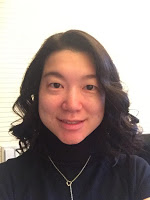PhD Defenses around the world: a defense at Ohio State
 Cindy Lee studied linguistics and microbial biology at UC Berkeley, where she researched genetic engineering in sorghum. She then did her PhD at The Ohio State University, where she researched DNA repair in the context of breast cancer, but she would have graduated much sooner if her dissertation focused on cake. Now, she works as a science writer and editor. You can find her Tweeting @geneandtonic and blogging at Genes and Tonic.
Cindy Lee studied linguistics and microbial biology at UC Berkeley, where she researched genetic engineering in sorghum. She then did her PhD at The Ohio State University, where she researched DNA repair in the context of breast cancer, but she would have graduated much sooner if her dissertation focused on cake. Now, she works as a science writer and editor. You can find her Tweeting @geneandtonic and blogging at Genes and Tonic.
The ball was in the red zone, and the crowd was chanting, “DE-FENSE! DE-FENSE!” Well, not quite. These are some ways my PhD defense differed from an American football game:
- There was no whistle for time outs: When I wasn’t in the lab, I was supposed to be thinking about my research. If I procrastinated by baking cheesecake or watching sports, then I probably wasn’t trying hard enough to be a Real Scientist (hello, imposter syndrome). If I took a 20-minute nap, then I probably delayed my graduation by 20 years (there’s always that fear). For the record, I took innumerous naps, ate copious amounts of baked goods, and cheered for my team when they won the national championship in the first college playoff. My PhD took six years.
- There were no commentators: Some of the people who attended my defense were colleagues who could understand the experiments I did, while others joined for moral support. One friend brought her nine-year-old daughter, who made a few notes. They weren’t watching on TV, listening to commentators explain the technicalities. So, at the beginning of my talk, I followed my advisor’s guidance and told the story “so that grandma can understand.”
- There was no tackling: Most people in my program agreed that the candidacy exam (writing a project proposal, then presenting it to your faculty advisory committee) was harder than the defense. I would agree (though there is always that fear that something will go wrong). For my program, if your advisor and the committee agreed to let you schedule the defense, they had already heard about your project at yearly meetings and approved your dissertation, so they were most likely going to let you pass. The “hard hits” were more likely to happen during the candidacy exam than the dissertation defense.
Still, there were some similarities between my PhD defense and an American football game:
- Hefty rule book: There were so many guidelines and forms–for my program, the graduate school, and the university. We typically counted backwards from the deadline to file the paperwork to graduate for a particular semester. I wanted to walk in the May commencement ceremony, so the last day to file was in April, and before I filed, I had to pass my defense. Counting backward from the defense, I had to give myself enough time to send my dissertation to my committee, receive their comments, make revisions, and get final approval. That meant I submitted my dissertation in March. That meant I called a committee meeting about half a year before to make sure my advisor and committee agreed that my project was ready for that timeline. Some of the paperwork and policies included formatting everything correctly (making sure all the references are in the right place and right style takes a lot of time!) and getting your dissertation to an external committee member. To make sure that the advisor and three committee members fairly assessed your qualifications, the graduate school would assign someone from a different department to attend your defense. Because I defended toward the end of the semester, external committee members were in high demand, and I didn’t know who mine would be until the day before.
- Coach and teammates: Ultimately, I was responsible for asking questions, designing experiments to answer those questions, analyzing my data, and telling the story. Throughout this process, it was immensely helpful to have guidance from my advisor, labmates, and classmates.
- The crowd: Ok, so I scheduled my defense for a room that holds about 40 people, not a stadium that holds 100,000 (but that IS where we have commencement). Still, I knew that everyone in that room was there to support me. So, I tried to put on a good show. This included explaining how my research helped us understand the causes of breast cancer, making a few jokes, and putting up a picture of the day my advisor and I wore the same outfit. He’s 6’6″. I’m 5’3″.
It’s been almost three years since my PhD defense, and I still feel really lucky all the pieces came together–lining up a job that fulfilled two of my goals (seeing the world outside the US, working in science communication), finishing up experiments for a journal article right before I left, and hosting my grandparents (who flew to Ohio from Taiwan) and parents and brother (who flew in from California) for graduation/commencement. The PhD journey isn’t always fun, and the road isn’t always clear, but my family and friends helped me find my way.
